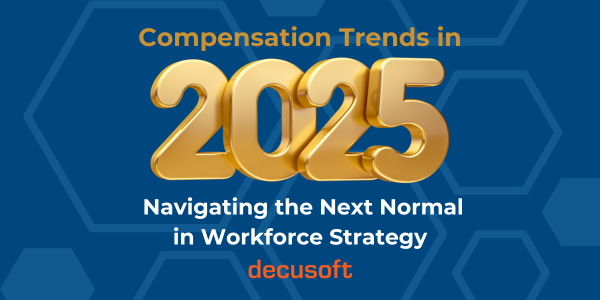Building a robust plan for compensation management is critical for organizations. A well-researched compensation management plan allows you to meet goals around pay equity and other critical factors while retaining talent and rewarding employees for work well done. Designing an effective compensation management strategy can also help you attract and retain talent and remain agile as market conditions change. Compensation management is one of the most complex processes handled by an organization’s HR department, especially in highly competitive and regulated industries like financial services. Although many firms use similar approaches to structuring their plans, at the end of the day, each organization has a very unique way of managing compensation.
Employee compensation is the largest component of an organization’s total labor costs. Based on research from Deloitte, employee compensation accounts for up to 70% percent of an organization’s total costs. Business owners and managers, including human resource professionals, should be aware of the impact compensation management has on an organization. By understanding how compensation management affects your business you can better select the right compensation management system for your organization.
What is Compensation Management?
Compensation management is the discipline of compensating employees for work performed through a variety of mechanisms. A well-planned compensation management approach ensures that your organization’s pay in terms of salaries and bonuses is competitive compared to others in the industry, appropriate for your organization, and equitable. Your compensation management program should be designed to meet the needs of your organization’s workforce and should be reviewed periodically. Compensation management officers should be well versed in reviewing employment data, be familiar with industry rules and regulations, and be able to manage a set of complex compensation and benefits administration tasks.
Compensation management is directly related to the mission HR plays in your organization. As mentioned earlier, a good compensation management plan benefits all aspects of the hiring process, employee engagement, and your organization’s overall success. If your employee’s compensation package including salary, benefits, and pay equity is not managed properly your organization may suffer when hiring new talent and retaining existing talent. It is important to remember that when creating a compensation management plan you should include more than just monetary compensation in the form of salary and bonuses. For instance, did you know four out of five people would prefer better benefits over a higher salary? When creating a compensation plan for new employees be sure to include benefits that fit your employee’s lifestyle and support management outcomes.
Consider including benefits such as:
- Flexible time off
- Flexible working hours
- Stock options/equity
- Fully covered healthcare
- Matching 401k
- Maternity and paternity leave
- Transit reimbursement
- Work from home
- Unlimited PTO
- Child care reimbursement
- Learning seminars
- Wellness benefits
- Student loan reimbursement
- Education reimbursement
- Profit-sharing
- Other employee benefits
The Complete Guide to Compensation Program Solutions
Your organization’s compensation package should not only consist of what you pay your employees or how much you cover in health insurance. An effective compensation management policy encompasses the entire philosophy of what your business values while striving to hit short and long-term goals. A robust compensation management plan is complete when it has a philosophy, strategy, guidelines for pay, policies, and processes that results in total compensation in alignment with business objectives.
Compensation Management Objectives
Another important component of compensation management is pay equity. Pay equity is a common topic of discussion within organizations in terms of predictive analysis and balancing internal equity with external competition. Many organizations are struggling to attract and retain top talent, and pay equity is shining a spotlight on this in 2021. Many organizations are looking at ways they can analyze new hire offers in real-time. This way they can better identify trends of pay inequity in the hiring process that may have gone unnoticed otherwise. This is often where the pay inequity gap begins. A lower starting salary sets an employee up for a lower salary compared to their fellow coworkers over the long term. DecuSoft’s Compose offers an easy way to visualize pay equity and ensure your organization is meeting compliance requirements.
Once an organization can begin to track and measure salary trends, you can begin to make actionable changes. This proactive approach will better enable companies to ensure their employees are being paid fairly, ultimately resulting in less turnover and the ability to attract top talent. Along these lines, transparency in earnings is also growing in importance, leading to a large increase in demand for additional reporting functionality and customized total reward statements per employee.
A Mercer study discovered that when employees feel they understand how pay is set, they are more satisfied in their roles. This holds true even if they disagree with specific pay decisions and structure. When employees understand how salaries and bonuses are set, their overall job satisfaction increases. Here are some questions to consider when setting up your compensation processes:
- What do we value and how do we want to reward those values?
- What pay choices will help us keep, motivate, develop, and attract top talent?
- Do we want to focus on pay for the jobs that are mission-critical? How?
- Does this philosophy change for part-time employees or contractors?
- Will your executive compensation package look different from your manager’s package?
- Does our company compensate employees in hopes of increasing retention rates?
- Does our incentive compensation plan include a management self-assessment plan?
After you’ve discussed the overarching philosophy for your compensation strategy with your HR professionals, begin to think about how your company will match those bold plans with actions. Start by considering your business goals for the next five years. Does your organization want to acquire new customers, increase profit, and/or maximize growth? We recommend your organization design the compensation plan to support your overarching goals and benchmarks.
Create Your Total Compensation Philosophy
By answering the questions we laid out above, you’ll be on the path to mapping out your philosophy. Consider what type of compensation each position will receive. There’s base salary, bonus, commissions, company perks, and even equity or ownership. Before you can continue on with detailing what each role will receive, you need to map out what the key motivators will be. Develop a market-based approach. Your pay packages and job descriptions should mirror or beat the market. Do competitive research and online comparisons to understand exactly how much a “Marketing Manager” in your area is making. Focus on incentivizing factors that will increase the overall success of your business rather than just short-term goals.
Did you know: 34% of employees leave their current job due to dissatisfaction with compensation (Pew Research Center, 2021). However, you don’t want to overpay candidates for the position so much that you are no longer competitive with others in your industry. We recommend you conduct a job analysis and evaluation. Look at every single job in the organization. Who does what? What do the org charts look like? Build out accurate job descriptions for every single role within the organization. You may need to conduct extensive interviews with employees and managers to accomplish this. To decide who gets paid what, you need to know what each role is responsible for.
Compensation Design
Consider the following factors when designing your compensation management plan.
Build pay ranges and grades
Determine what “grade” each particular job falls within; e.g. a Grade A job would be VP level, Grade B would be Director, and so forth. What would be the smallest or greatest salary figure within that range? Build out pay grades and ranges all the way down to Entry/Associate level. This will provide discipline to your recruiting efforts and make raise percentages easier as employees “graduate” from one grade to the next.
Legal compliance
Are you up to date on local and national payroll codes? Your HR department can advise on any legal considerations as you build your compensation plan. Staying away from costly fines will keep more money in the comp pool and out of the hands of governing bodies.
Get executive buy-in
You can’t do much without the blessing and input of board members and upper management. Align the entire plan based on the company’s major goals and be sure to present the plan to leadership. Name a “compensation committee” to lead the charge in the future if your company is not large enough to have a stand-alone comp department.
Establish adjustment and review protocols
When are salary adjustments implemented and review processes completed? Bonuses, promotions, and cost-of-living increases should also work into your plan. Communicate to managers and employees. After approval from the board, present the program to your managers. Ask for feedback and take suggestions seriously. Develop a follow-up plan for managers to then communicate the structure to employees. Work with HR information systems staff to establish effective implementation procedures, develop appropriate data input forms, and create effective monitoring reports for senior managers.
Install, monitor, and refine
Markets change so it’s important to perform routine salary audits to ensure salary ranges reflect current compensation trends in a particular industry. Gather feedback from managers and employees about what can be fixed. Provide access to employees via HR portals so they can self-service when needed. Once again, your compensation plan is not a one-time discussion. It will always need changes and updates.
Hiring and retaining high-performing employees is essential to a company’s success! It’s business-critical that your organization creates a comprehensive compensation strategy that includes a plan considering salary, benefits, bonus, and perks. Make sure to document your current processes thoroughly, test potential plans against requirements, and evaluate multiple solutions to find the right fit for your organization. Compensation plans should never be on auto-pilot, so you need the best compensation management software for your business.
Simplify Your Compensation Management With Software
Many organizations today run complex compensation management plans using spreadsheets. Compensation Management software significantly reduces the risk of costly mistakes and makes the overall process more efficient. If you are currently in the market for a compensation management solution, you can request a demo of Compose by Decusoft.




